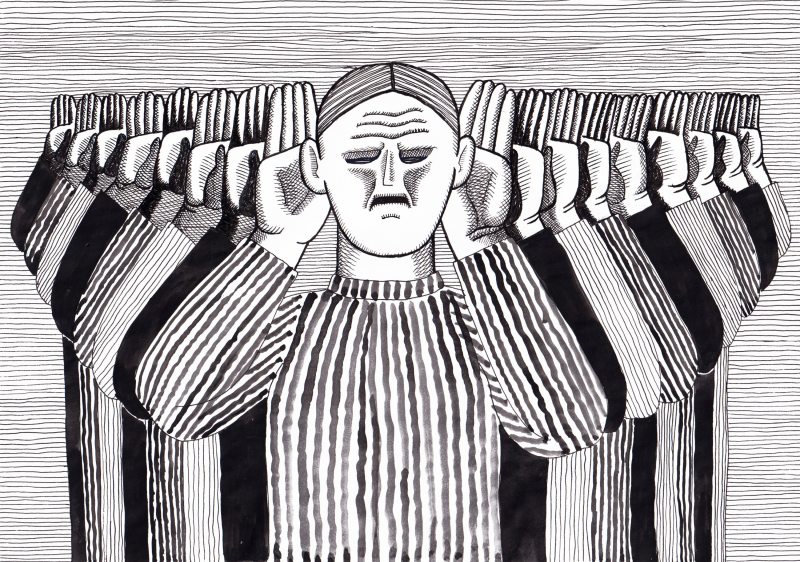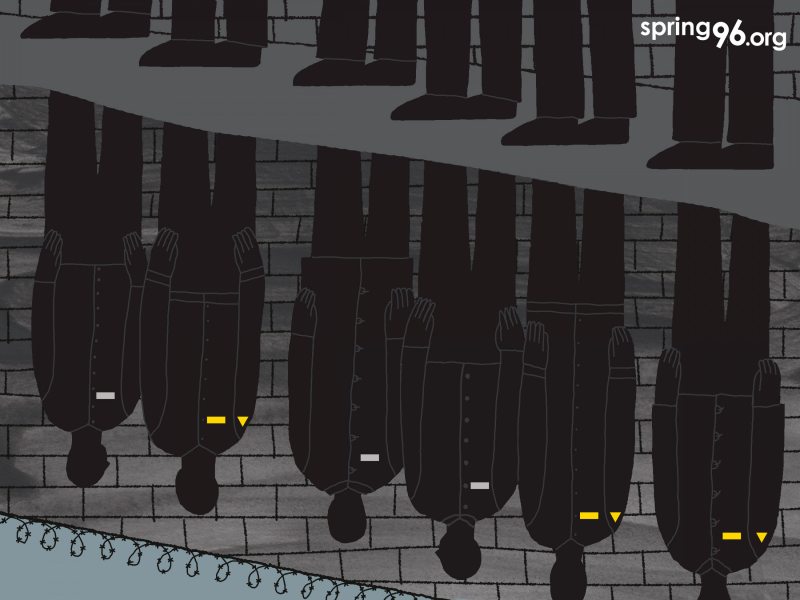Sleeping on the floor and an unbuttoned jacket: how political prisoners are persecuted for "malicious disobedience"
The initiation of a new criminal case is one of the main fears of political prisoners serving sentences in correctional institutions. According to Article 411 of the Criminal Code (malicious disobedience to the requirements of the administration of a correctional institution), at the initiative of the administration of colonies and prisons, prisoners can indefinitely receive additional terms. This is often done for far-fetched reasons in order to put additional pressure on a prisoner. Human rights activists have been pushing for its decriminalization for many years. According to Viasna, over the past three years, criminal cases have been opened against at least 33 political prisoners under this article, and against some of them twice. Viasna has analyzed court rulings under Article 411 of the Criminal Code and reports absurd and far-fetched violations political prisoners are punished for, which they are later tried for and receive additional terms.
What are the grounds for initiating a new criminal case?
Recently, criminal cases have been increasingly initiated against prisoners in correctional institutions under Article 411 of the Criminal Code for disciplinary violations for which they have already been punished. This contradicts Article 14, Paragraph 7, of the International Covenant on Civil and Political Rights, according to which no one should be repeatedly convicted of the same offense.
But despite this, most administrations of correctional institutions throughout Belarus actively continue to arbitrarily persecute prisoners for far-fetched reasons. At the same time, at least six political prisoners were convicted of "malicious disobedience to the administration of the institution" as many as two times in a row.

Belarusian political prisoners in high-security prisons: pressure intensifies
How does this work in practice? Upon arrival at the colony, prisoners are immediately placed in "quarantine", where for about two weeks they are introduced to the internal regulations and explained responsibility for their violation. After that, the prisoners are transferred to detachments and sent to work. It is known that many political prisoners are put under pressure immediately upon arrival: during the "quarantine" or after being transferred to a detachment.
In order to complicate the lives of political prisoners, the administration acts according to a usual plan: violation — report — punishment — a new criminal case.
Almost all political prisoners in the colonies are recognized as "malicious violators of the regulations" in the very beginning. To do this, the administration draws up several reports against them and issues various penalties. At the same time, to become a "malicious violator", it is enough to get only four reprimands or get a day in a punishment cell. This status imposes additional restrictions on prisoners, as well as brings them closer to a new criminal case under Article 411 of the Criminal Code or to being transferred to a prison security level.
Most often, prisoners are first deprived of visits, care packages, and calls. After that, they are put into a punishment cell or special housing unit (SHU), where some are held for several months in a row. One cannot take any personal belongings with them, just toilet paper, soap, a small towel, toothpaste, and a brush.
Prisoners can be held in a punishment cell for no more than 10 days, but this does not prevent the administration from drawing up new reports after the expiration of the previous 10 days. The next level of penalty is a special housing unit (SHU). The conditions there are slightly better than in a punishment cell and a prisoner has a right to correspondence. Prisoners are put there for up to six months for "systemic violations".
According to the Criminal Code, those prisoners who were given disciplinary punishment in the form of transfer to SHU, a punishment cell, or to a high-security prison during a year for violating the order of serving a sentence are held liable under Article 411 of the Criminal Code Under this article, prisoners can be sentenced to imprisonment for up to one year, and up to 2 years for a particularly dangerous repeated offense.
What actions of political prisoners does the administration consider "violations"?
The grounds for penalties vary depending on the colony. Viasna human rights defenders analyzed some court rulings under Article 411 of the Criminal Code in relation to political prisoners.
For example, in Homieĺ women's colony No. 4, reports against women are drawn up for "writing a report in an inappropriate form, comparing conditions of detention to "genocide"; "sleeping sitting on the floor with her head on a stool"; "being rude to correctional facility staff", "communicating with other persons"; "performing physical exercises lying on the floor at a forbidden time, taking off her clothes"; "unbuttoning her jacket"; "destroying a letter written to her daughter"; "going to the toilet without warning"; "not getting up, not saying hello, not identifying herself when the cell door opened", "refusing to remove things from the radiator."
And in the women's colony No. 24 in Zarečča, they can issue a penalty for "refusing to go to work."
In men's colonies, "violations" are "refusing to clean the cell, toilet, or the area of the detachment", "refusing to go for a walk at 5:30 in the morning", "sleeping on the floor in a punishment cell near the radiator", "staying near the stadium without a jacket and in sneakers"; "talking with other convicts", "refusing to take his assigned place in the residential section."
Usually, reports against one person are drawn up for various reasons. But there are cases when the reason is always the same. Thus, one of the political prisoners, who served time in Mahilioŭ prison No. 4, was punished solely for "refusing to clean the courtyard for a walk," and a political prisoner in Horki colony No. 9 was punished only for "refusing to go to work."
It should be noted that disciplinary penalties against political prisoners are almost always arbitrary and represent politically motivated persecution. This is one of the ways of pressure that allows you to indefinitely keep a prisoner in jail.
Why should this article be excluded from the Criminal Code?
Human rights activists have been demanding the exclusion of article 411 from the Criminal Code for many years. They draw attention to the fact that under this article the punishments are imposed by the court on the basis of decisions taken in prisons and correctional colonies by employees of the internal affairs bodies. This provokes arbitrary and often disproportionate prosecution in relation to the severity of the offense; these shortcomings cannot be eliminated even by appealing penalties.
In addition, almost all trials of political prisoners for "malicious disobedience" happen in places of detention. Because of this, it is almost impossible to get to the court session, sometimes even for relatives. Some relatives will find out about the new court session only through the schedule on the website of the Supreme Court. And in order to get to the colony or prison for trial, relatives need to get permission from the head of the correctional institution through an application. But this is often denied. It should be noted that the inability of the public to attend the court session violates the defendant's guarantees of a fair trial, including those of a public trial.
During the hearings, the testimony of witnesses — correctional officers — is used as evidence of the guilt of the accused. But it is known that Palina Sharenda-Panasiuk's case materials were also accompanied by videos from surveillance cameras in the punishment cell, which allegedly show "violations".
In August 2023, lawyers of the Viasna Human Rights Center appealed to the Special Rapporteur on the human rights situation in Belarus regarding the persecution of prisoners under Article 411 of the Criminal Code. Lawyers once again drew attention to the fact that this article should be excluded from the code, since prosecution under Article 411 of the Criminal Code violates the human right to personal freedom and the right not to be tried or punished twice.



















